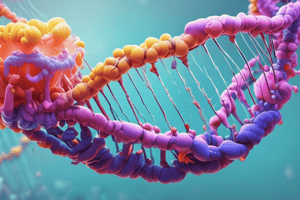Podcast
Questions and Answers
What is functional genomics?
What is functional genomics?
The study of how genes and intergenic regions of the genome contribute to different biological processes.
Which of the following are areas of study in functional genomics? (Select all that apply)
Which of the following are areas of study in functional genomics? (Select all that apply)
- Transcriptomics (correct)
- Pharmacogenomics
- Metabolomics (correct)
- Genomics (correct)
Genomics differs from classical genetics by considering one gene at a time.
Genomics differs from classical genetics by considering one gene at a time.
False (B)
What is a gene?
What is a gene?
What defines epigenomics?
What defines epigenomics?
What is a metabolome?
What is a metabolome?
The transcriptome is static and does not change over time.
The transcriptome is static and does not change over time.
Which of the following components does proteomics study?
Which of the following components does proteomics study?
What does the term 'transcriptome' refer to?
What does the term 'transcriptome' refer to?
Study Notes
Introduction to Functional Genomics
- Functional genomics examines the contribution of genes and intergenic regions to various biological processes on a genome-wide scale.
- Aims to link genotype (genetic makeup) to phenotype (observable characteristics) by analyzing how biological components work together.
The "Omics" in Functional Genomics
- Includes several fields: genomics, epigenomics, transcriptomics, proteomics, and metabolomics.
Genomics
- Studies the complete genomes of organisms, taking into account all genetic material rather than isolated genes.
- Utilizes recombinant DNA, DNA sequencing, and bioinformatics for genome analysis.
- Focuses on genes, regulatory sequences, and noncoding DNA.
Genes
- Defined as DNA segments encoding a final gene product, either a polypeptide or functional RNA.
- Can express multiple products from a single DNA segment.
- Contains regulatory sequences that control gene expression and replication processes.
Epigenomics
- Explores why a shared genome can produce diverse cell types and reactions.
- Investigates chemical modifications (epigenome) affecting genome packaging and function.
- Epigenetic changes can alter over time and are heritable, despite the static nature of the genome.
Transcriptomics
- Involves analyzing all RNA molecules produced within cells, highlighting genes that are actively expressed.
- Reflects dynamic changes over time and varies by cell type.
- Encompasses all forms of RNA, including mRNA, and includes the complexity of various transcript modifications.
Proteomics
- Focuses on the large-scale study of proteomes, the entirety of proteins produced in a biological context.
- The proteome is variable across different cells and changes over time, influenced by factors beyond gene expression levels.
Metabolomics
- Investigates small molecules (metabolites) in cells and biofluids, collectively known as the metabolome.
- Reflects underlying biochemical activity and physiological states influenced by genetic and environmental factors.
- Provides insight into the molecular phenotype and metabolic interactions within biological systems.
Summary of Functional Genomics
- Integration of transcriptomics, proteomics, and metabolomics aims to create a comprehensive model of biological systems and their functionalities.
Studying That Suits You
Use AI to generate personalized quizzes and flashcards to suit your learning preferences.
Description
This quiz covers the basics of functional genomics as applied to biomedical science. Students will explore how genes contribute to diseases and various biological processes. Dive into the key concepts and categories of human diseases relevant to this field.




